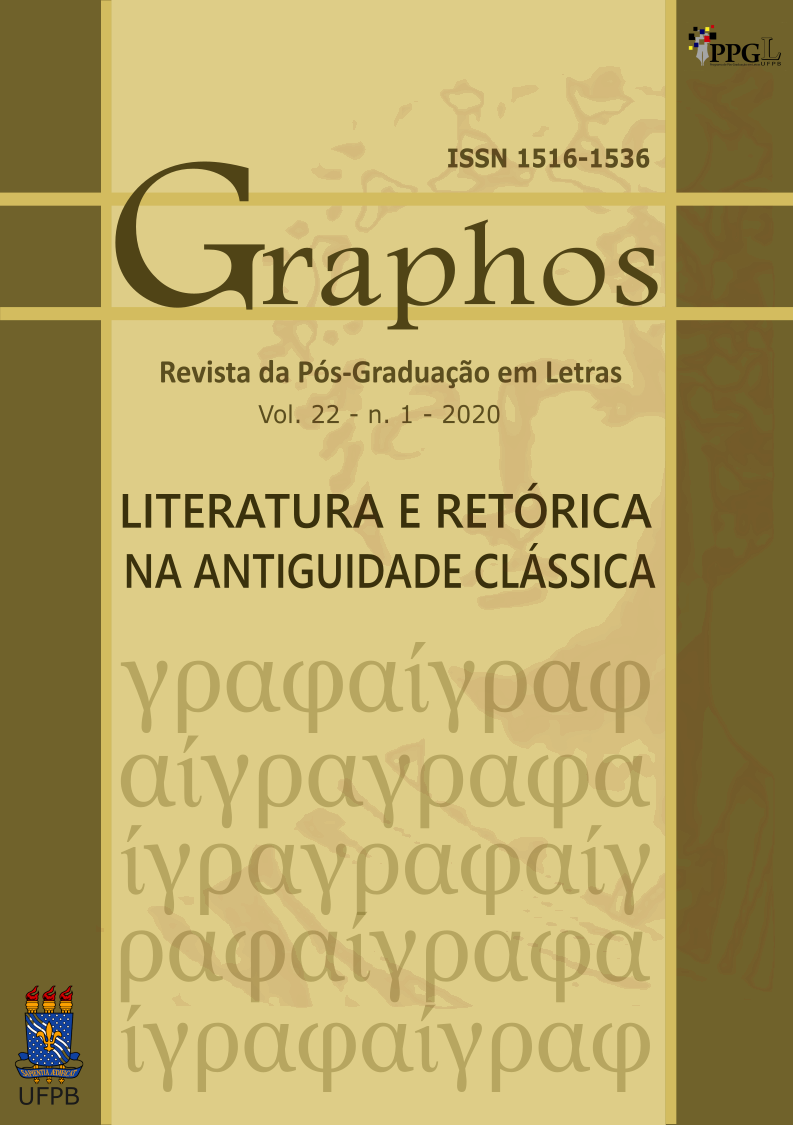How to say goodbye: epideictic theory and practice in Statius’ (silv. 3.2) and Quevedo’s (Silva Quinta) propemptiká
Keywords:
Ancient rhetoric, Epideictic genre, Siluae, Statius, Francisco de QuevedoAbstract
This paper aims to analyze the relation between rhetoric and poetic in Statius’ (c. I) and Francisco de Quevedo’s (c. XVII) poetry. The ancient rhetoric was divided by Aristotle into judicial, deliberative and epideictic genres following the goals of the speaker. The third genre was categorized from situations by Menander Rhetor in his book named On epideictic and the farewell speech (propemptikón) was one of them. Therefore, following the considerations about the propemptikón systematized by Menander, we sought to stablish the connections between the rhetorical epideictic in the mentioned authors’ siluae.
Downloads
References
ARISTÓTELES. Retórica. Trad. de Manuel Alexandre Júnior, Paulo Farmhouse Alberto e Abel do Nascimento Pena. Lisboa: Casa da Moeda, 2005.
BRUNETTA, Giulia. Strategies of Encomium in Statius’ Silvae. 2013. 225 f. Thesis (PhD in Classics) - Department of Classics, Royal Holloway, University of London, London, 2013.
BURGESS, Theodore Chalon. Epideictic literature. Chicago: The University of Chicago, 1902.
CAIRNS, Francis. Generic Composition in Greek and Roman Poetry. Corrected and with new material. Ann Arbor: Michigan Classical, 2007 [1972].
CANDELAS COLODRÓN, Manuel Ángel. Las silvas de Quevedo. Vigo: Servicio de Publicacións da Universidad de Vigo, 1997.
CARVALHO, Luiza Helena Rodrigues de Abreu. Elementos de permanência do gênero silva da Antiguidade romana à Modernidade espanhola: Estácio e Quevedo (sécs. I-XVII). 2018. 153 f. Dissertação (Mestrado em Letras), Programa de Pós-Graduação em Letras, Universidade Federal do Espírito Santo, Vitória, 2018.
GRIMAL, Pierre. Dicionário da Mitologia Grega e Romana. Trad. de Victor Jabouille. Rio de Janeiro: Bertand Brasil, 2005.
HORÁCIO. Odes e Canto Secular. Org. de Heloísa Penna e Júlia Batista Castilho de Avellar. Belo Horizonte: Viva voz, 2014.
LAGUNA MARISCAL, Gabriel. Estácio: Silvas III: Introducción, Edición Crítica, Traducción y Comentario. Sevilla: Fundación Pastor de Estudios Clásicos, 1992.
LEITE, Leni Ribeiro; CARVALHO, Luiza Helena Rodrigues de Abreu. O gênero retórico demonstrativo e sua influência em obras poéticas segundo Menandro Retor, Horácio e Quintiliano. Roda da Fortuna, v. 4, n. 2, p. 209-225, 2015.
MANÍLIO. Astronômicas. Tradução, Introdução e notas de Marcelo Vieira Fernandes. In: FERNANDES, Marcelo Vieira. Manílio: Astronômicas. 2006. 289 f. Dissertação (Mestrado em Letras Clássicas) – Programa de Pós-Graduação em Letras Clássicas, Universidade de São Paulo, São Paulo, 2006. p. 48-256.
MENANDER RHETOR. On epideictic. Edited with translation and commentary by D. A Russell and N. G. Wilson. Oxford: Oxford University, 1981.
PLINY THE ELDER. Naturalis Historiae. Trans. by Harris Rackham. Cambridge: Harvard University, 1938.
PUTNAM, Michael C. J. Statius Silvae 3.2: Reading Travel. Illinois Classical Studies, v. 42, n. 1, p. 83-139, 2017.
QUEVEDO, Francisco de. Las tres musas ultimas castellanas. Madrid: Imprenta de Sancha, 1791.
STACE. Silves. Texte établi par Henri Frère et traduit par H. J. Izaac. Paris: Les Belles Lettres, 1944.
STATIUS. Silvae. Traduzido por Anthony S. Kline. 2012. Disponível em: <https://goo.gl/aN1bQp>. Acesso em: 24 jan. 2020.
STATIUS. The Silvae of Statius. Translated with notes and Introduction by Betty Rose Nagle. Indianapolis: Indiana University, 2004.







